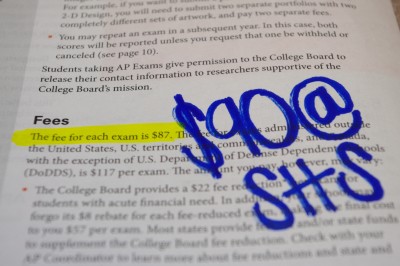
This year, the administration charged $90 per AP exam, three dollars higher than the price listed in the AP exam booklet distributed to all students taking an exam. This was due to increases in administrative costs from administering the tests.
“Last year we came up short at administrative costs,” James Farnen, assistant principal, said. This year, the administration aims to end up “cost neutral and make sure [it doesn’t] go into the red,” as Farnen said.
Farnen added that the administration does not make money on the AP testing, but its policies on AP exams make it very costly.
“We don’t turn kids away,” Joanna Seiter, Staples secretary, said. “The more classes and tests that we offer, the more costly it’s been.”
In addition, the rental costs of administering AP exams has gone up. Farnen noted that the rental bill is getting excessive as well, with more tables and chairs as more kids enroll in AP classes and take AP tests.
“We have to put [the students] in the library and the gym at the same time,” Farnen said.
In addition to high AP class enrollment, Staples has a policy of allowing kids taking exams at Staples even when the don’t take the course at Staples, such as AP Psychology or AP Japanese Language and Culture. For each subject, Staples must hire a proctor, at a price of $90 per subject.
“One or forty kids, the proctors are getting paid,” Farnen said. This applies to makeup exams as well, making the process even more expensive, and contributing to the three dollar increase in the AP exam price.
Some students were not irked with the price increase at all, whereas others took issue with it, as none were informed by the administration as to why it occurred.
“It’s only a three dollar increase, why does it matter so much?” said Lia D’Addario ’11.
In contrast, Jennie Lunde ’11 was put off by the change in price. “I think its ridiculous and unnecessary that SHS has increased the charge,” Lunde said.
Upon being informed the reason for the charge, students became more understanding.
“I think everyone would be more understanding if they knew the reason for the increase,” Kristen Weiler ’11 said.













































